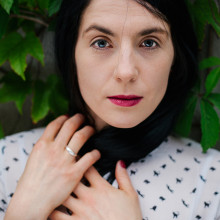Polish literature

Małgorzata Lebda
Małgorzata Lebda (born 1985) is a poet with a PhD in Humanities. She has many passions, including sports, photography and academic research. The primary focus of her research is the relationship between literature and visual art. However, it is her poetry that has earned the most recognition.
Małgorzata Lebda has her own unique poetic idiom and extensive literary experience. She made her debut in 2005 in Nowy Legion, a magazine published by her university. Her first collection of poetry, Otwarta na 77 stronie (“Open on Page 77”), was published in 2006. Her next book, Tropy (“Traces”), was published in 2009. Critics agree that it was in this collection that Lebda formulated the essence of her poetics and mapped out the contours of her lyrical world. Her book Granica lasu (“The Edge of the Forest”, 2013) was nominated for the K. I. Gałczyński “Orfeusz” Poetry Award (2014) and the Krystyna and Czesław Bednarczyk Poetry Award (2014). Her book Matecznik (“Queen Cells”, 2016) gained even more praise. It won the “Orfeusz” Award in 2017 as well as the Stanisław Barańczak Scholarship Award. It was also selected as the Krakow Book of the Month.
Małgorzata Lebda’s poetic journey began with minor impressions and lyrical notes in her debut volume, then developed into a narrative form in her next collection. The most recent three books are filled precisely with this—poetic stories. Their subject matter revolves around events that are captured in lyrical images, enclosed in dense, metaphorical scenes. One could even say that they are symbolic, for there are many cultural symbols in this poetry, many images arranged in a unique web of archetypes. It all means that Lebda’s poetic images are not only a representation of a certain external reality, but also spiritual states, infused with subjective emotions.
Lebda’s next volumes of poetry to be published were Sny uckermärkerów (“Dreams of the Uckermärker”, 2018) and Mer de Glace (“Mer de Glace”, 2022), both of which were nominated for the “Orfeusz” and “Silesius” Awards. She received the Gdynia Literary Award for Sny uckermärkerów in 2018, and the Wisława Szymborska Award for Mer de Glace in 2022.
In 2023, Małgorzata Lebda made her debut as a prose writer with the novel Łakome (Voracious), in which she depicts the impermanence of nature, the mortality of all living beings (both human and non-human), the inevitability of loss, and paths towards accepting loss as an essential part of life.
The vitality and strength of Lebda’s poetry and prose result from its biographical elements. She makes no secret of this. Quite the contrary—she goes to great lengths to draw a connection between the rustic scenes that appear in her work and the countryside where she grew up. It is depicted with its own unique blend of customs, traditions, and multi-faceted ethnic culture. However, Lebda also transcends the boundaries of her own biography in an equally consistent manner, adding complexity to the images so that they ultimately reveal not only something about herself, but universal truths about human existence. This is achieved through her efforts to go beyond realism and transform images into symbols. In her work, her childhood world becomes a model of the world in general. Light and darkness; the distinct times of day, night and year; the four elements; plants; animals; home; religious customs; the simplest activities—all of these elements in Lebda’s poetry and prose form a story about life, death, and human fate.
BIBLIOGRAPHY
- Otwarta na 77 stronie (“Open on Page 77”), Wydawnictwo Towarzystwa Słowaków w Polsce, Kraków 2006
- Tropy (“Traces”), Zeszyty Poetyckie, Gniezno 2009
- Granica lasu (“The Edge of the Forest”), Wydawnictwo WBPiCAK, Poznań 2013
- Matecznik (“Queen Cells”), Wydawnictwo WBPiCAK, Poznań 2016
- Sny uckermärkerów (“Dreams of the Uckermärker”), WBPiCAK, Poznań 2018
- Mer de Glace (“Mer de Glace”), Wydawnictwo Warstwy, Wrocław 2021
- Łakome (Voracious), Znak, Kraków 2023
TRANSLATIONS
English
- Voracious (Łakome), trans. Antonia Lloyd-Jones, UK: Linden Editions, 2025
Italian
- Mer de Glace, trans. Linda Del Sarto, Italy: Valigie Rosse, Vecchiano, 2024
- La cella reale (Matecznik), trans. Marina Ciccarini, Italy: Ensemble, Roma, 2018
Danish
- Hjemsteder (Matecznik), trans. Frej Larsen, Denmark: Em, 2023
Czech
- Matečník (Matecznik), trans. Bogdan Trojak, Czech: Weles, Brno, 2019
- Sny ucker-märkerů (“Dreams of the Uckermärker”), trans. Bogdan Trojak, Czech: Weles, Brno, 2021
Ukrainian
- Holod 2016-2018 (selected poems), trans. Jurij Zawadski, Ukrainian: Vidavnictvo Krok, Ternopìl', 2020
Serbian
- Jezik zemlje (selected poems), trans. Biserka Rajčić, Serbian: Treći Trg: Čigoja štampa, Beograd, 2017
Spanish
- Insaciablei (Łakome), trans. Abel Murcia, Spain: Barcelona: Temporal Casa Editora 2024
Slovenian
- Žetev (selected poems), trans. Katarina Šalamun Biedrzycka, Maribor: Kulturno društvo Mariborska literarna družba, 2021